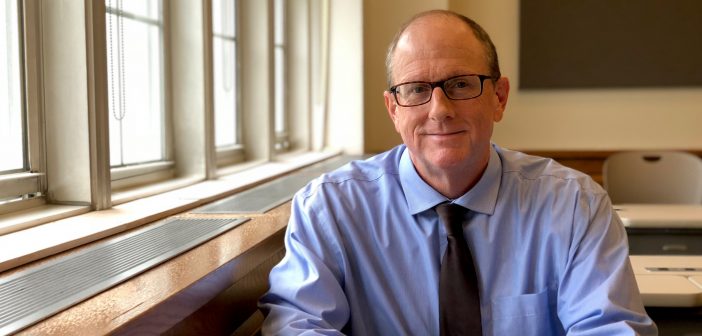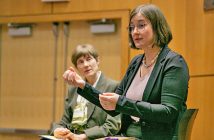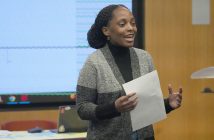This January, he will become a visiting scholar at the New York University Robert F. Wagner Graduate School of Public Service, where he will collaborate on a project that combats similar hate speech.
Only this time, Anderson is dealing with religious nationalists: those who use religion as an excuse to advance their own non-religious purposes—often involving hateful actions and language—in their native countries.
He calls Poland, a country where the majority of the population is Roman Catholic, a severe example. Many Catholic Poles claim that because immigrants and refugees are neither Catholic nor Polish, they can’t be true members of their country, he explained. Anderson argues that not only is their rhetoric is inherently wrong, these false statements also undermine the credibility of the Catholic Church and, he added, negate the church’s overall goal: commitment to the common good of humanity worldwide.
“The declaration of human rights, the United Nations—Catholic churches adopted that, which means that all of this nationalist kind of language is contrary to what the church believes,” he said. “Catholics are not called to identify themselves with any particular nation or with any particular culture. Catholics are supposed to see themselves as belonging to a heavenly kingdom.”
As a young boy, Anderson lived in a Catholic household that embodied those beliefs. His father was a news cameraman who covered the career of Martin Luther King Jr., the deadly 1958 bombing of a black Birmingham church, and civil rights activities; his mother was a progressive Catholic and social worker who worked with “the poorest of the poor,” he said.
“The environment I grew up in was one where Catholics were really encouraged to see African Americans as our brothers and sisters,” he said, “and really push back on the language of exclusivism and denial of people’s rights.”
By finding ways that Fordham can collaborate with NYU, Anderson hopes to develop educational programs for religious leaders that explain why religion and nationalism are unrelated. He says it’s important to train leaders—pastors, bishops, religion teachers—on how to train people to respond to religious nationalism. He added that it’s also critical to show religious leaders how to illustrate the flaws with religious nationalism, and explain to everyday people how it cannot be legitimately claimed as a religious movement. Anderson, who is exploring various foundations and other granting agencies that would fund these programs, aims to apply for three or four grants. He says securing a grant related to Catholic nationalism is especially critical.
The Roman Catholic Church is the largest Christian church—home to more than one billion members. Catholic nationalism is popping up in multiple places across Europe, including Estonia, Lithuania, Germany, France, and Austria, he added.
“There are priests and bishops in Poland and elsewhere who are presenting Catholic nationalism as a real option, and they’re not being disciplined at all. They’re being allowed to act more or less as independent operators,” he said. “I’m hoping to motivate the bishops to see that this is a real significant problem. It’s going to undermine how people see the credibility of the church, even more than we’re dealing with already.”
This is the second project he has conducted with NYU. In the first partnership, Anderson developed educational programs for seminarians that provided strategies they could use to promote civil discourse in politics.
“If we can teach people, hopefully in the Catholic schools and in other institutions on the ground, then when they get older and they’re approached by these religious nationalists,” he said, “they will see the problems with it. Or at least they’ll be prepared to respond.”



